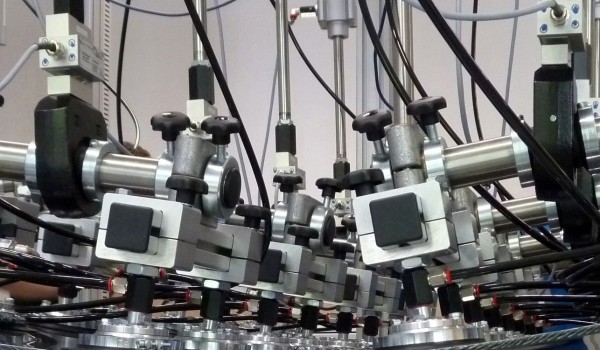Bystronic glass and the Fraunhofer Institute for Solar Energy Systems ISE have successfully completed the mechanical load test and hail impact test on the jointly developed TPedge module. The TPedge module technology features local fixing of the cell array – without lamination – and a glass edge sealing.
The TPedge module, jointly developed by Bystronic glass and the Fraunhofer Institute for Solar Energy Systems ISE, has successfully completed the mechanical load test and hail impact test. The characteristic features of the TPedge module technology are the local fixing of the cell array – without lamination – and a glass edge sealing. The TPedge modules in the full-format measuring 1,636mm x 985mm were subjected to the mechanical load test up to a force measuring 2,400 N/m2 and the hail impact test with ball speeds of 23 m/s.
The tests that were performed on two TPedge modules were based upon the requirements as set out by the IEC 61215 Standard. No loss in performance could be detected on the modules following testing in the accredited “TestLab PV Modules” at Fraunhofer ISE. Losses in performance of up to 5% are permitted in the complete test sequence in accordance with the standard. According to a “TestLab PV Modules” statistic, approximately 10% of module failures that occur during the certification tests are as a result of the mechanical load and hail impact test. The “TestLab PV Modules” in Freiburg is operated by the Fraunhofer Institute for Solar Energy Systems ISE and the VDE Testing and Certification Institute.
The TPedge module is a joint development by Fraunhofer ISE in Freiburg and the Bystronic glass Group on the basis of a Fraunhofer patent. The wafer-based solar module can be produced much quicker and less expensively than standard wafer modules. The time and cost savings are a consequence of a simplified modular structure and a completely innovative production technology. “The cell array is locally fixed between two glass plates,” says Dr. Harry Wirth, Head of Group Photovoltaic Modules, Systems and Reliability at Fraunhofer ISE. “The utilization of foils and the associated laminating are not necessary.” The edge sealing of the TPedge module is carried out via the application of the thermoplastic material TPS® at 130°C, even an additional aluminium frame is not necessary. Tobias Neff, Solar Product Manager at Bystronic glass explains: “The TPedge technology reduces the costs of the module production by 30 to 40% – at an aspired cycle time of 45 seconds per module line. As a result, the overall costs of a PV module can – depending upon the cost proportion of the solar cells – be reduced by approximately 14%.”
The production lines for TPedge modules can be designed in various expansion stages. In the serial production line, it is possible to manufacture a module in less than a minute – compared to the 16 minutes required for the usual standard procedure. The new production principle is inspired by the sealing technology used in insulating glass production. The development of the TPedge process for the production of modules with thermoplastic sealing on the glass edge represents a great innovative leap in module production.
Fraunhofer ISE and Bystronic glass will manufacture approximately 200 TPedge modules in 2012 designated for the façade of a new Institute laboratory. The project aims to further develop and demonstrate the TPedge technology and is being supported with funds from Germany’s Federal Environment Ministry.


